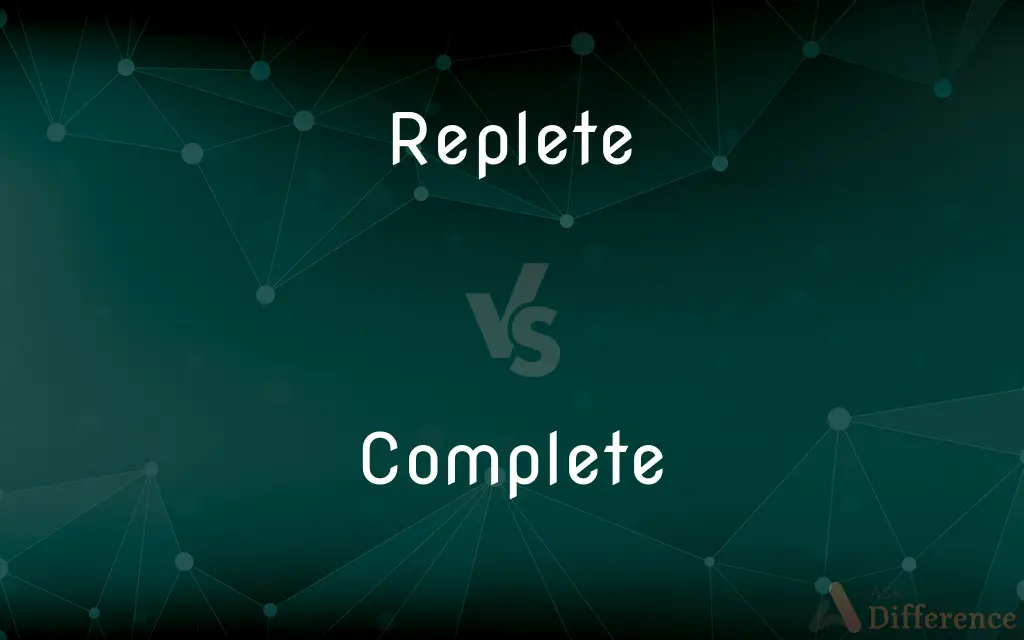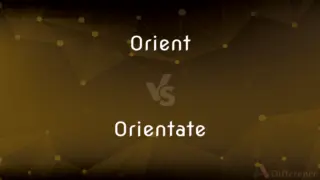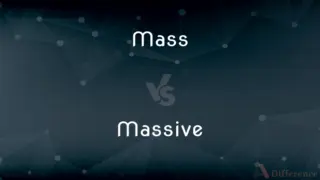Replete vs. Complete — What's the Difference?
Edited by Tayyaba Rehman — By Urooj Arif — Updated on April 21, 2024
"Replete" suggests being fully or abundantly filled, often with specific contents, while "complete" implies having all necessary parts or being finished.

Difference Between Replete and Complete
Table of Contents
ADVERTISEMENT
Key Differences
"Replete" often describes something filled to satisfaction or brimming with content, whereas "complete" refers to the state of being whole or finished with no missing parts.
In literature, a narrative can be replete with symbolism, suggesting a rich layer of meaning, while the plot itself may be complete, meaning it has reached a conclusive end.
A meal can be described as replete with a variety of flavors and ingredients, highlighting its richness and abundance, whereas describing a meal as complete would emphasize that it includes all the courses expected of it.
A person may feel replete after consuming enough to satisfy their hunger, while they may consider a project complete when all objectives have been met.
A document can be replete with details, indicating extensive or thorough inclusion of information, while a complete document has all the necessary sections and appendices required.
ADVERTISEMENT
Comparison Chart
Definition
Filled or well-supplied with
Fully finished or whole
Usage in context
Often used with abstract nouns
Commonly used with concrete nouns
Connotation
Abundance, often positive
Wholeness, neutral
Example context
"The book is replete with details."
"The puzzle is complete."
Semantic focus
Quantity and quality of contents
Presence of all elements
Compare with Definitions
Replete
Filled to the brim.
The library was replete with rare collections.
Complete
Entirely finished.
The building project is complete.
Replete
Abundantly supplied.
His speech was replete with literary references.
Complete
Thorough.
She gave a complete account of the events.
Replete
Rich in contents.
The documentary was replete with fascinating facts.
Complete
Concluded.
His training is now complete.
Replete
Heavily imbued.
The novel is replete with irony and satire.
Complete
Having all parts.
The report is complete with all appendices.
Replete
Saturated.
The course was replete with useful information.
Complete
Fully formed.
The team is now complete with the new members.
Replete
Filled or well-supplied with something
Sensational popular fiction, replete with adultery and sudden death
Complete
Having all necessary or normal parts, components, or steps; entire
A complete medical history.
A complete set of dishes.
Replete
Abundantly supplied; abounding
A stream replete with trout.
An apartment replete with Empire furniture.
Complete
(Botany) Having all principal parts, namely, the sepals, petals, stamens, and pistil or pistils. Used of a flower.
Replete
Filled to satiation; gorged.
Complete
Having come to an end; concluded
The renovation of the kitchen is complete.
Replete
Usage Problem Complete
A computer system replete with color monitor, printer, and software.
Complete
Absolute; thorough
Complete control.
A complete mystery.
Replete
A specialized worker in a honey ant colony that stores food in its distensible abdomen for later use by other members of the colony.
Complete
Accomplished; consummate
A complete musician.
Replete
Abounding.
Complete
(Football) Caught in bounds by a receiver
A complete pass.
Replete
Gorged, filled to near the point of bursting, especially with food or drink.
Complete
To bring to a finish or an end
She has completed her studies.
Replete
A honeypot ant.
Complete
To make whole, with all necessary elements or parts
A second child would complete their family. Fill in the blanks to complete the form.
Replete
(transitive) To fill to repletion, or restore something that has been depleted.
Complete
(Football) To throw (a forward pass) that is caught in bounds by a receiver.
Replete
Filled again; completely filled; full; charged; abounding.
When he of wine was replet at his feast.
In heads replete with thoughts of other men.
Complete
(ambitransitive) To finish; to make done; to reach the end.
He completed the assignment on time.
Replete
To fill completely, or to satiety.
Complete
(transitive) To make whole or entire.
The last chapter completes the book nicely.
Replete
Fill to satisfaction;
I am sated
Complete
(poker) To call from the small blind in an unraised pot.
Replete
Filled to satisfaction with food or drink;
A full stomach
Complete
With all parts included; with nothing missing; full.
My life will be complete once I buy this new television.
She offered me complete control of the project.
After she found the rook, the chess set was complete.
Replete
(followed by `with')deeply filled or permeated;
Imbued with the spirit of the Reformation
Words instinct with love
It is replete with misery
Complete
Finished; ended; concluded; completed.
When your homework is complete, you can go and play with Martin.
Complete
Generic intensifier.
He is a complete bastard!
It was a complete shock when he turned up on my doorstep.
Our vacation was a complete disaster.
Complete
In which every Cauchy sequence converges to a point within the space.
Complete
In which every set with a lower bound has a greatest lower bound.
Complete
In which all small limits exist.
Complete
In which every semantically valid well-formed formula is provable.
Complete
That is in a given complexity class and is such that every other problem in the class can be reduced to it (usually in polynomial time or logarithmic space).
Complete
Filled up; with no part or element lacking; free from deficiency; entire; perfect; consummate.
Ye are complete in him.
That thou, dead corse, again in complete steelRevisit'st thus the glimpses of the moon.
Complete
Finished; ended; concluded; completed; as, the edifice is complete.
This course of vanity almost complete.
Complete
Having all the parts or organs which belong to it or to the typical form; having calyx, corolla, stamens, and pistil.
Complete
To bring to a state in which there is no deficiency; to perfect; to consummate; to accomplish; to fulfill; to finish; as, to complete a task, or a poem; to complete a course of education.
Bred only and completed to the tasteOf lustful appetence.
And, to complete her bliss, a fool for mate.
Complete
Come or bring to a finish or an end;
He finished the dishes
She completed the requirements for her Master's Degree
The fastest runner finished the race in just over 2 hours; others finished in over 4 hours
Complete
Bring to a whole, with all the necessary parts or elements;
A child would complete the family
Complete
Complete or carry out;
Discharge one's duties
Complete
Complete a pass
Complete
Write all the required information onto a form;
Fill out this questionnaire, please!
Make out a form
Complete
Having every necessary or normal part or component or step;
A complete meal
A complete wardrobe
A complete set pf the Britannica
A complete set of china
A complete defeat
A complete accounting
An incomplete flower
Complete
Perfect and complete in every respect; having all necessary qualities;
A complete gentleman
Consummate happiness
A consummate performance
Complete
Having all four whorls or principal parts--sepals and petals and stamens and carpels (or pistils);
Complete flowers
Complete
Highly skilled;
An accomplished pianist
A complete musician
Complete
Without qualification; used informally as (often pejorative) intensifiers;
An arrant fool
A complete coward
A consummate fool
A double-dyed villain
Gross negligence
A perfect idiot
Pure folly
What a sodding mess
Stark staring mad
A thoroughgoing villain
Utter nonsense
Complete
Having come or been brought to a conclusion;
The harvesting was complete
The affair is over, ended, finished
The abruptly terminated interview
Common Curiosities
Is "replete" used for physical fullness?
Yes, it often describes a sense of physical or metaphorical fullness.
What type of contents does "replete" typically refer to?
It refers to both tangible and intangible contents.
What does "replete" suggest in usage?
It suggests fullness or abundance in contents.
Can a book be replete and not complete?
Yes, if it's filled with content but lacks a final chapter.
Can a person be described as replete?
Figuratively, suggesting they are full of emotions or thoughts.
Can "complete" imply something is thorough?
Yes, it can imply thoroughness or the presence of all necessary parts.
What is the difference in application between "replete" and "complete"?
"Replete" focuses on the content's quality and quantity, while "complete" on the presence of all elements.
How does "complete" relate to processes?
It describes the finality or conclusion of processes.
Can "replete" imply excess?
Sometimes, especially if something is overly filled.
When can a project be considered complete?
When all its goals and objectives have been achieved.
Is "complete" a term used in legal documents?
Yes, often to indicate that all sections are present.
What makes a meal replete?
Variety and richness of ingredients make a meal replete.
How do you know if a puzzle is complete?
If all pieces fit and the picture is fully formed.
Does "complete" have a positive connotation?
It's generally neutral, indicating completion.
What does it mean if a course is replete with information?
It means it offers a wealth of information, possibly more than expected.
Share Your Discovery

Previous Comparison
Orient vs. Orientate
Next Comparison
Mass vs. MassiveAuthor Spotlight
Written by
Urooj ArifUrooj is a skilled content writer at Ask Difference, known for her exceptional ability to simplify complex topics into engaging and informative content. With a passion for research and a flair for clear, concise writing, she consistently delivers articles that resonate with our diverse audience.
Edited by
Tayyaba RehmanTayyaba Rehman is a distinguished writer, currently serving as a primary contributor to askdifference.com. As a researcher in semantics and etymology, Tayyaba's passion for the complexity of languages and their distinctions has found a perfect home on the platform. Tayyaba delves into the intricacies of language, distinguishing between commonly confused words and phrases, thereby providing clarity for readers worldwide.
















































